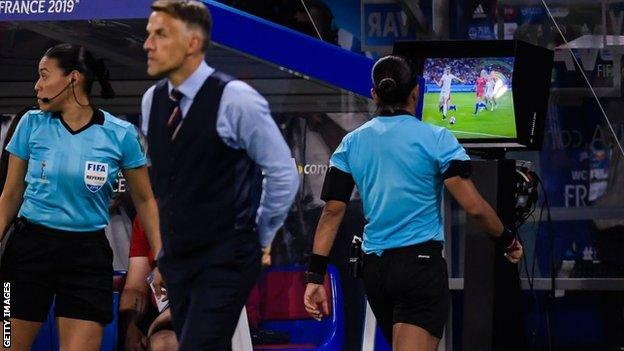VAR will not re-referee Premier League - referees' chief Mike Riley
- Published
- comments

VAR was used at the Women's World Cup in France
The Premier League will not be re-refereeing the game by VAR and will set a high bar for decisions, says referees' chief Mike Riley.
Video assistant referees will be used in the Premier League from the start of the new season, after clubs agreed to their introduction.
Riley and his team of referees have spent the past two years preparing and training all the match officials, including live trial matches, and have been encouraged by the progress they have made.
However, he stressed that VAR is still a work in progress. "It will take us two or three years to get this right," said Riley, who is general manager of the Professional Game Match Officials Limited.
He said there had been a "reaction" to some uses of VAR at the Women's World Cup in France, but across Europe in other competitions it had been implemented successfully.
"You look at the work in Italy, you look at the work in Spain, the Netherlands and in Germany latterly, and the more people get familiar with the process and work out how to harness it for the game I think the more comfortable people feel,"
The key area for implementation of VAR in the Premier League is the height of the threshold to change original decisions, and Riley believes working out when to intervene is the main challenge for the game as a whole, not just for referees.
"Where VAR has been implemented successfully in other competitions it's been a very high bar," he said.
"We don't want VAR to come in and try to re-referee the game. We actually want it to protect the referees from making serious errors, the ones everybody's goes: 'Well, actually, that's wrong.'
"If we keep to that really high bar there is more chance of keeping the flow of the game, the intensity of the game and people enjoying the spectacle of it rather than constantly referring to the video screen for changing decisions."
During their trials in the Premier League last season - up to week 33 - there were eight checks on average, with the average check lasting 29 seconds.
Riley stressed the key to successful implementation of the system is communication.
"The way we get it right is by everyone in the game talking: players, managers, referees, fans, broadcasters. We'll all have an opinion, it's all valid," he said.
"Between us, let's work out where we set that intervention. If we do that we'll create something that's really good for our game.
"At the forefront of our minds all the time are two things: minimum interference for maximum benefit, and to maintain where possible the flow, intensity and speed of the game, because that's what people want to watch in Premier League football."
Other areas of debate from the Women's World Cup include the new laws surrounding handball, but Riley does not believe it is a problem in England.
"I actually think handball is in a really good place in this country, and that's the message that we get from all the clubs - from the managers and the players - when we go and talk to them.
"We have a philosophy that says we want handball to be something that has an impact on the game.
"We are not looking for the ball to be striking arms and we do accept, when we are looking for what is an unnatural position for the arm, that arms move. We don't expect players to defend with their arms behind their back, nor do we expect forwards to try and drill the ball to the hand to win a free-kick.
"The way we've actually implemented handball for the past two or three seasons is the way we are going to continue to do it in the future."
He said, as an example, that the winning penalty for the Netherlands against Japan at the Women's World Cup would not have been awarded in the Premier League.
"We consider that to be a natural position of the hand. You don't expect defenders to have their arms glued to their side, so if the hand is in a natural position then it's not an offence," he said.
A last-minute spot-kick from Martens wins the game for the Dutch